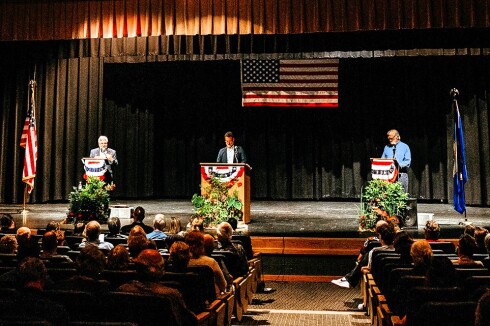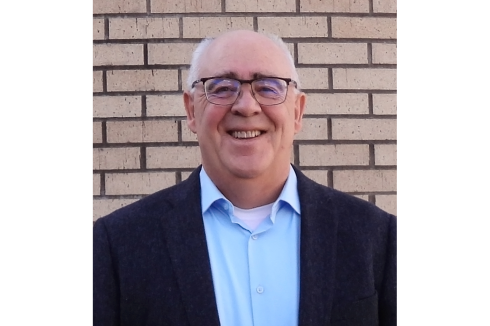Minnesota lawmakers appear poised to pass a state law that will exempt U.S. Steel's Keetac taconite operation in Keewatin from the state’s sulfate pollution standard.
The Minnesota Senate Environment and Energy Committee Thursday advanced a bill that would prohibit the Pollution Control Agency from enforcing the rule, which is part of the company’s pollutant discharge permit issued by the state under the federal Clean Water Act.
The bill, which advanced without recommendation, now goes to the full Senate for a vote. The full House passed the same bill on Wednesday, just six days after it was first introduced.
Officials from U.S. Steel, which owns Keetac, say they are being unfairly singled out because their operating permit is the state’s only mine operation permit that requires meeting the 10-parts-per-million sulfate standard.
While the state sulfate standard should apply to all industries that release discharges into waters that have wild rice, Keetac’s is indeed the only current mining company permit that requires the limit be met. And Iron Range lawmakers say U.S. Steel is threatening to sue the state if the rule is enforced.
Keetac has been idled for nearly a year, with some 400 employees out of work, as U.S. Steel sees reduced need for the iron ore used to make domestic steel. The parent company, which announced layoffs of hundreds of salaried employees this week across North America, has not said when Keetac might reopen.
The legislation, HF 3726 and SF 3376, is the latest round in the state sulfate debate as environmental and tribal interests move to push enforcement of the sulfate limit while industry and Iron Range politicians battle back. Research shows that sulfate in high levels harms wild rice, most likely as sulfate transforms to sulfides absorbed by the plant. But the impact also appears to vary in different types of water chemistry.
Minnesota lawmakers ordered the PCA to study the issue and the agency last year said it will do away with the statewide sulfate limit and instead develop sulfate limits for each specific waterway that holds wild rice. That lake-specific regulation could take years to develop, and the old statewide limit was supposed to remain in place until that happens.
The new state law would prohibit the PCA from enforcing the old limit only on Keetac but follows a 2015 bill passed by lawmakers that also prevents the PCA from enforcing the statewide sulfate limit in new permits.
Both bills are examples of “legislating science” that pushed the group WaterLegacy to petition the Environmental Protection Agency to investigate the PCA and Minnesota’s handling of Clean Water Act regulations. Indeed EPA officials have been at both Duluth and St. Paul PCA offices combing over records in recent months to see how the state is enforcing the federal act on the mining industry.
WaterLegacy has asked the EPA to consider whether Minnesota should be stripped of its jurisdiction over regulation of federal pollution laws for mines.
“It seems really poorly timed that the Legislature is passing laws that clearly violate the Clean Water Act at the same time the EPA is in the state investigating the MPCA for failing to enforce the Clean Water Act on mining operations,’’ Paula Maccabee, attorney for WaterLegacy, told the News Tribune on Thursday. “It really looks like the Minnesota Legislature is working for the mining industry to prevent Clean Water Act enforcement.”
Maccabee testified Thursday that the EPA has made it clear that the state Legislature can’t dictate how to enforce federal Clean Water Act standards. She also said the state attorney general is well equipped to handle any litigation.
“You don’t pass a state law violating a federal law because someone threatens you with a lawsuit,” she said.
The House bill is sponsored by Rep. Jason Metsa, DFL-Virginia, while Sen. David Tomassoni, DFL-Chisholm, has the Senate version.
“I know that U.S. Steel felt that they needed legislation, and that working with the (PCA) they didn’t feel that the law we passed in 2015 covered this issue for that specific permittee,” Metsa said at a House hearing, according to the legislative news service Session Daily. “What we’re trying to do with this is avoid litigation with a company that would essentially would be suing the state of Minnesota.”
Larry Sutherland, general manager of Minnesota Ore Operations for U.S. Steel, told the House committee Tuesday this permit made it the only mining facility in Minnesota subject to that standard.
“Because the Keetac permits are unique, (the bill) is designed to clarify the intention (of the 2015 legislation) to ensure the MPCA will treat Keetac the same way as all other wastewater dischargers in the Minnesota,” Session Daily reported Sutherland as saying.
Bill exempts Keetac from sulfate standard
Minnesota lawmakers appear poised to pass a state law that will exempt U.S. Steel's Keetac taconite operation in Keewatin from the state's sulfate pollution standard.The Minnesota Senate Environment and Energy Committee Thursday advanced a bill t...

Steve Kuchera / File / Duluth Media Group
ADVERTISEMENT








